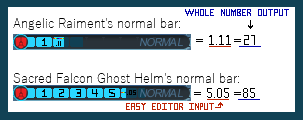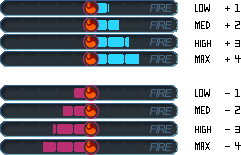Template:ArmorList/doc
From SpiralKnights
This template is a complex yet simplistic table meant to be used by both new and old players. It's a compressed way to find and compare gear items via sorting. It utilizes visual icons, sorting cells, tooltips, and show/hide coding in a way that hasn't been seen on the wiki until now, so take careful note of the following documentation, as the template is touchy, sensitive, and requires lots of love!
Contents
Parameters
Required
{{List/Window/NoHeader
|width=100%
|body=
{{ArmorList/start}}
- starts the template
{{ArmorList
| name =
- The true, full name of the item as seen in-game, no shortcuts or abbreviations. All five miles of the name. Yep!
| OPTIONAL PARAMETER =
| OPTIONAL PARAMETER =
(etc)
}}
- Body segment of template
}}
{{Table/End}}
- Ends the template (yes, for the encompassing background cell that keeps everything in line, the }} in addition to the {{Table/end}} is needed).
- Editors: Feel free to tidy this part up if you can, I tried, but it's a very sensitive template. Best of luck if you take on this endeavor!
Optional
The following all have "blank" as an option - in other words, you type in nothing. And I don't mean the word "nothing" haha! Actually nothing. Zip. Nada.
In fact, if the armor doesn't have one of these variables, it's best not to include it at all. You can, but the sheer number of items makes for very long pages, and empty parameters just means more data, even if they are empty. See examples in the usage section below.
To see all options for these parameters, I've made a show/hide list below. In general, you'll be able to see what's available and how to word things based on this template's published presence in other pages, but for the sake of documentation done properly, I've put them here too.
- normal
- a value above 0, but no greater than 9.
- elemental
- a value above 0, but no greater than 9.
- piercing
- a value above 0, but no greater than 9.
- shadow
- a value above 0, but no greater than 9.
- curse=
- a value at or above -4, but no greater than +4.
- fire=
- a value at or above -4, but no greater than +4.
- freeze=
- a value at or above -4, but no greater than +4.
- poison=
- a value at or above -4, but no greater than +4.
- shock=
- a value at or above -4, but no greater than +4.
- sleep=
- a value at or above -4, but no greater than +4.
- stun=
- a value at or above -4, but no greater than +4.
- ability 1 =
- a line of text as appropriate
- ability 2 =
- a line of text as appropriate
- ability 3 =
- a line of text as appropriate
- penalty =
- a line of text as appropriate
Usage
To organize gear into a sortable table so players old and new can find and compare item statistics regarding the following variables:
- Defenses (normal, elemental, piercing, shadow) - for helmets, armor, and shields
- Offenses (normal, elemental, piercing, shadow) - for bombs, handguns, and swords
- Health - for shields
- Attack Speed - for weapons
- Status Resistances and Weaknesses - for helmets and armors, with shields only being resistant
- Abilities - all gear item types
- Penalties - all gear item types
Additional information (such as recipe, where to get, and so on) can be found on individual pages of linked-to items.
See "templates used on this page" to modify entries for the following:
General Data Entry
So far, the only defense (normal, elemental, piercing, shadow) bar values we see after quantifying via pixel counting are:
00.05
00.07
00.10
00.12
01.07
01.11
01.12
01.14
02.00
02.02
04.00
04.04
04.05
04.06
05.01
05.05
05.07
05.08
06.05
06.13
07.11
08.13
0 should never be entered and remain a blank space.
9 is used as a noteholder about how the stats image might not be fully informative about the item's performance, if the bar is completely full.
So far, the only values we use for status resistance and weaknesses are:
-4
-3
-2
-1
1
2
3
4
Where do these numbers come from?
For defense (normal, elemental, piercing, shadow), we count pixels. This isn't so bad, because we don't see the full range of possible pixel values. Tiered items tend to follow familiar patterns, revealed when data is put for each one into this template. A filled bar (16 pixels) is worth a full number. A partially filled bar is worth a decimal number, with each pixel increasing the decimal value from 00.01 up to 00.15, with .16 being a full bar and therefore a full number.
These bars have not changed width for a very long time (in relation to the game's lifespan, we can say they've not changed since official release). Their appearance was made more crisp in the April 2013 update, but their pixel width did not change.
These numbers are useful for intensity sorting on the table, but have little bearing when calculating damage received. This is partially due to Tier and Heat level influence on an item, so these numbers should only be taken as general indicators, and not solid mathematics.
For status, we don't see bars other than the following for armors or helms, so we can use a simple -4 to +4 numbering system (which seems to correspond well with UV levels):
Shields...how do they work?
Future
I've tried to design this template to be flexible, because Spiral Knights is a dynamic game that is somewhat like biology - it has patterns, and then it breaks them. And we editors have a fun time dealing with that, don't we! To change variables, use the "replace" function in a simple program such as notepad - like icon size? Just REPLACE 36px with #px, and so on. This can be applied with varying levels of complexity (like with file names, replace "liquifier" with "slime killer" or whatever, just an example) as needed without breaking the numbering system of the template, so long as you don't forget those pesky brackets.
But this can change in a single update! And we can deal with this possibility, oh yes we can.
We have number values in the associated templates arranged in a decimal place-holding system, so editors can add in new values without disrupting an entire numerically ordered column. This is intrinsically beautiful in a way, because not only is it consistent with in-game visuals (though not calculations), it works well with a numerical column that has decimal placeholders. Sometimes the game gets new stat bar values, so this flexibility is needed. Having all possible values in the 00.01-9 range actively taking up space in the template all the time is not efficient, hence this design. How to update? Simply count the pixels in the stats bar (described above) and enter that value into the appropriate ListDefense/TYPE template, and then in the <span> aspect of that same template, enter the same number with a negative (-) sign. It should only take a moment :D.
But why have all this anyway?
Remember that the class="sortable" type of table puts the lesser numerical values near the top, so the <span> function is needed for the type of sorting users desire - the strongest buffest toughest stuff at the top, please!
In conclusion
I worked with several other editors, namely Icytea, to get this table under control for both new and old player use.
If looking at that wad of text in the template doesn't make sense and needs updating, take a gander at Wikipedia's Help Page for Sortable Coding.
If more abilities (or more levels of intensity of existing abilities) show up, add them to Template:ListAbilities with an appropriate <span> value.
Finally, thanks for helping and reading this novel (a joke about the length of this documentation) about this template! If you're still having trouble getting changes to work, or input values to work, then notify editors on the Spiral Knights Wiki Editors Forums.

